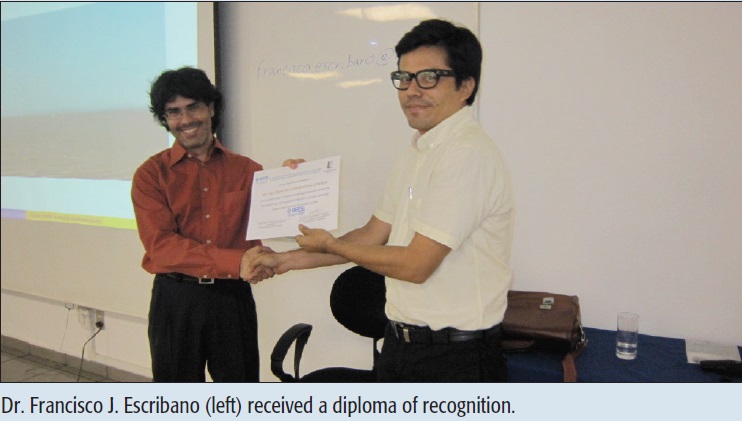
In July 2015, the IEEE El Salvador ComSoc chapter hosted an international seminar. The focus was on current trends in mobile communications. The seminar, which lasted eight hours, was given by Dr. Ing. Francisco J. Escribano from Universidad Alcalá de Henares, Madrid, Spain. Dr. Escribano is an active member in IEEE Spain and has also been a member of the IEEE Spanish national board since 2016.
Thirty nine professionals attended the call. There were representatives from many different places from the telecommunication sector. Forty percent were from the industry, forty percent were from the public sector, and twenty percent were from universities. Very few events in the daily life of this tiny nation attract so many and such a diversity of telecommunication professionals.

The seminar was divided into four parts. The first part introduced enabling technologies needed for present and future mobile generations. Concepts like spread spectrum modulation, adaptive techniques, OFDM, MIMO, spectrum management, millimeter wave propagation, and networking improvements were introduced. The second part presented the concept of standards and their role in industry. An overview was made over past cellular network standards, from the almost forgotten 1G to the newest ideas behind 5G. In part three, current cellular network deployments were analyzed. In this part, as an example, the lecturer used the evolution of Spanish mobile networks to illustrate key spectrum management decisions. In Europe, the transition from analog to digital television technology released a significant amount of high quality radio spectrum. Future mobile network deployments and, in general, the wireless communications industry, are going to benefit from it. Part four was dedicated to business: new business models are emerging and need to be taken into consideration.

Participants’ opinions were very positive. At the same time, the event was enriched through different comments made during the seminar. Such comments represented industry, government, and university perspectives.
In coming years, Salvadoran society will face many different challenges. In 2016, following a supreme court decision, the government has to redefine the mechanism through which spectrum is allocated. At the same time, a Terrestrial Digital Television Standard has to be chosen. In 2017, most spectrum licenses have to be renewed. Incumbent cellular phone companies need to know if new rules are going to be introduced. All these issues make IEEE ComSoc activities of paramount importance.
Through the years, the El Salvador and Guatemala ComSoc chapters have developed a very close collaborative relationship. A week later, the same seminar was given in Guatemala City, where the Universidad Galileo hosted the event. Professionals from industry and professors from Galileo University attended the meeting.
Finally there was also spare time to visit a volcanic lake called Ilopango. The lake is known for being a possible source for the extreme weather events of AD 536 which triggered a catastrophic global climate change event. American paleo-ecologist Dr. Robert Dull, senior research fellow at the Environmental Science Institute at the University of Texas in Austin, said that the Ilopango volcano was the cause of the AD 536 climate cooling that lasted for at least two years, globally.